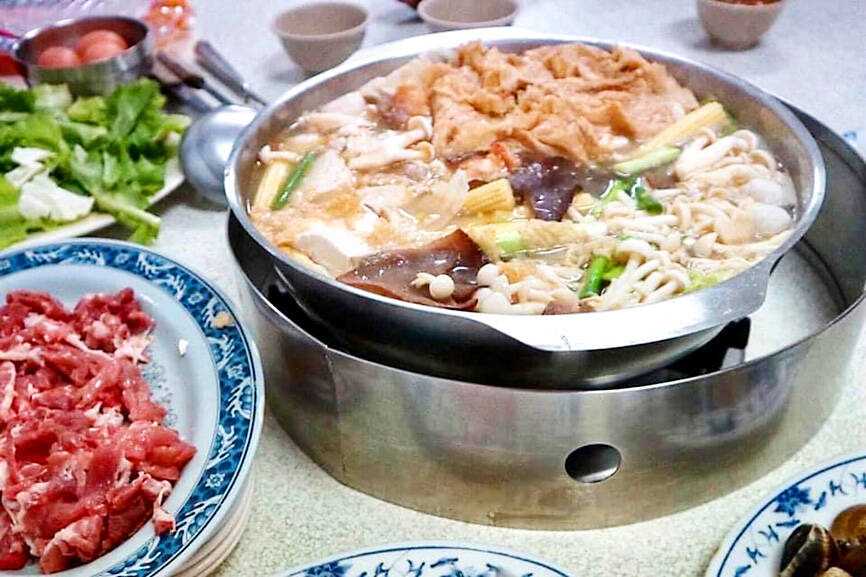A random inspection of 55 hotpot ingredients resulted in 10 failing the tests as they contained excessive pesticide residues, preservatives or aflatoxin, the Taipei Department of Health said yesterday.
Department chief secretary Chiu Hsiu-yi (邱秀儀) said that with weather turning cooler, the department last month conducted random tests of hotpot ingredients — a popular fare especially during winter in Taiwan.
The 55 items were: 15 types of vegetables that are at a higher risk of containing pesticide residues, 15 frozen hotpot processed foods, 10 meat products, five seafood items, five soybean products and five peanut powder.

Photo: Chiu Chih-jou, Taipei Times
They were tested for veterinary drug residues, animal ingredients, heavy metal substances, pesticide residues, food additives and fungal toxins, she said.
Five vegetables (three bok choy and two scallions) were found with pesticide residue levels exceeding maximum residue levels (MRLs), two peanut powder items had excessive levels of aflatoxins and three tofu products contained the preservative benzoic acid, Lee said
Most of the items that failed the inspections were taken from hotpot restaurants: bok choy from a Mo-Mo-Paradise branch contained three types of pesticides exceeding the MRLs; a peanut powder provided by Tian La Ma La (天辣麻辣) hotpot restaurant had excessive levels of aflatoxins; and a tofu from a Xin Dian Hotpot (辛殿麻辣鍋) contained benzoic acid, department data showed.
The items have been removed from the shelves and the department has notified its counterparts in other cities and counties where some of the items were produced.
As two of the three tofu items had no labels indicating where they were sourced, the two restaurants were each fined NT$30,000 (US$976).
“We urge farmers to use pesticides appropriately to reduce the risk of excessive residues,” Lee said. “We also encourage consumers to buy seasonal fruit and vegetables and wash them with running water, especially the roots and the stems, soak them for about 10 to 20 minutes and wash them again with running water before cooking, preferably with the pot not covered.”
Aflatoxins are toxic secondary metabolites produced by certain fungi that are often found in agricultural crops, such as peanuts, corn, rice, oat and nuts, and Taiwan’s high humidity and temperatures are conducive to their reproduction, so consumers should buy such products from reputable brands, check if their packaging is intact and store them in a dry place after opening, she said.
While benzoic acid is a legal food preservative, they cannot be used in soybean products, such as tofu, frozen tofu and soymilk, Lee said.
Excessive intake of the substance may cause diarrhea, abdominal pain and a rapid heartbeat, but it is soluble in water, so drinking plenty of water can help flush it out of the system, she said.

An essay competition jointly organized by a local writing society and a publisher affiliated with the Chinese Communist Party (CCP) might have contravened the Act Governing Relations Between the People of the Taiwan Area and the Mainland Area (臺灣地區與大陸地區人民關係條例), the Mainland Affairs Council (MAC) said on Thursday. “In this case, the partner organization is clearly an agency under the CCP’s Fujian Provincial Committee,” MAC Deputy Minister and spokesperson Liang Wen-chieh (梁文傑) said at a news briefing in Taipei. “It also involves bringing Taiwanese students to China with all-expenses-paid arrangements to attend award ceremonies and camps,” Liang said. Those two “characteristics” are typically sufficient

A magnitude 5.9 earthquake that struck about 33km off the coast of Hualien City was the "main shock" in a series of quakes in the area, with aftershocks expected over the next three days, the Central Weather Administration (CWA) said yesterday. Prior to the magnitude 5.9 quake shaking most of Taiwan at 6:53pm yesterday, six other earthquakes stronger than a magnitude of 4, starting with a magnitude 5.5 quake at 6:09pm, occurred in the area. CWA Seismological Center Director Wu Chien-fu (吳健富) confirmed that the quakes were all part of the same series and that the magnitude 5.5 temblor was

The brilliant blue waters, thick foliage and bucolic atmosphere on this seemingly idyllic archipelago deep in the Pacific Ocean belie the key role it now plays in a titanic geopolitical struggle. Palau is again on the front line as China, and the US and its allies prepare their forces in an intensifying contest for control over the Asia-Pacific region. The democratic nation of just 17,000 people hosts US-controlled airstrips and soon-to-be-completed radar installations that the US military describes as “critical” to monitoring vast swathes of water and airspace. It is also a key piece of the second island chain, a string of

The Central Weather Administration has issued a heat alert for southeastern Taiwan, warning of temperatures as high as 36°C today, while alerting some coastal areas of strong winds later in the day. Kaohsiung’s Neimen District (內門) and Pingtung County’s Neipu Township (內埔) are under an orange heat alert, which warns of temperatures as high as 36°C for three consecutive days, the CWA said, citing southwest winds. The heat would also extend to Tainan’s Nansi (楠西) and Yujing (玉井) districts, as well as Pingtung’s Gaoshu (高樹), Yanpu (鹽埔) and Majia (瑪家) townships, it said, forecasting highs of up to 36°C in those areas